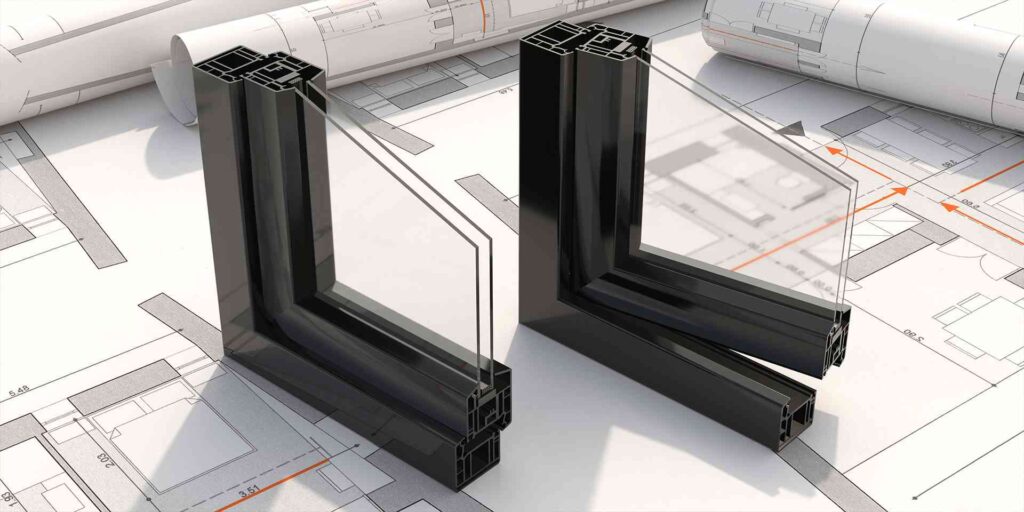Whether you like it or not, you need to pay attention and choose the right window materials for homes. Go for something that lasts, keeps your energy bills low, and looks great too. But with so many choices out there, it can get a little overwhelming.
Let’s discuss the best, high-quality window materials and break down what’s good (and not-so-good).
What is the Best Material for a Window?
There’s no one-size-fits-all! The best window materials for homes in Los Angeles, CA, really depend on a few things:
- The style of your home
- The weather where you live
- How much you want to spend.
Take a look at the 7 most common types of window materials for homes and their pros and cons:
Vinyl Windows
Vinyl window frames are made from PVC. They are tough, affordable, and super low-maintenance. They keep your home warm in the cold and cool in the hot weather— without needing much work from you. While they may not offer tons of color choices, they get the job done and look clean and simple.
Vinyl windows cost anywhere between $300 to $800 which is among the most affordable window materials for homes on the market today.
Best For: Budget-conscious homeowners who want energy efficiency and zero-fuss maintenance.
| Pros | Cons |
| Budget-friendly | Limited color options (can’t be painted) |
| Easy to maintain | Frames can look bulky |
| Great at insulating your home | Not ideal for high-end aesthetics |
| Won’t rot, warp, or rust | |
| Resists fading from sun and moisture |
Aluminum Windows
Aluminum windows offer a modern look with slim frames that maximize your view. They’re among the best window materials for homes because they are incredibly durable and stand up well to various weather conditions. However, they don’t insulate as well as other materials. In coastal areas, if not properly treated, they might corrode over time.
Aluminum windows typically cost between $400 and $850 per window, including installation.
Best For: Modern and industrial-style homes.
| Pros | Cons |
| Sleek, modern appearance with narrow frames | Poor thermal insulation (can be improved with thermal breaks) |
| Extremely durable and weather-resistant | Can corrode in coastal climates if not properly treated |
| Low maintenance |
Wood Windows
Wood windows bring a classic, natural beauty to any home. They offer excellent insulation and can be painted or stained to match your décor. However, they require regular upkeep to prevent issues like rot or insect damage and tend to be pricier than other window materials for homes.
Wood windows typically cost between $700 and $2,000 per window, including installation.
Best For: Traditional, colonial, and craftsman-style homes.
| Pros | Cons |
| Timeless, natural aesthetic | High maintenance (prone to rot, warping, and insect damage) |
| Excellent insulation properties | More expensive than other materials |
| Can be painted or stained to match any décor |
Fiberglass Windows
Fiberglass windows are a top-notch choice for homeowners who want windows that last. They’re incredibly strong and stand up to all kinds of weather without breaking a sweat. Plus, they insulate your home well. You can even paint them to match your home’s look. However, they cost more than vinyl or aluminum options and might be harder to find compared to other window materials for homes.
Fiberglass windows typically range from $500 to $1,500 each, including installation.
Best For: Homeowners seeking long-lasting, energy-efficient windows.
| Pros | Cons |
| Extremely durable and weather-resistant | Higher cost than vinyl or aluminum |
| Excellent thermal performance | Limited availability compared to other materials |
| Low maintenance and can be painted |
Composite Windows
Composite windows give you the strength of wood and the low upkeep of vinyl. They look great, insulate well, and last a long time — without needing much maintenance. You’ll find them in lots of finishes and styles, too. However, they usually cost more than vinyl windows.
Composite windows typically cost between $300 and $1,200 each, including installation.
Best For: Homeowners looking for a balance between style, durability, and efficiency.
| Pros | Cons |
| Combines the benefits of wood and vinyl | More expensive than vinyl |
| Highly durable and energy-efficient | |
| Low maintenance and available in various finishes |
Steel Window Frames
Steel window frames give your home a bold, modern, industrial look. They’re super strong, fire-resistant, and great for security. Many are custom-made to fit your space perfectly, and once installed, they can last a lifetime (seriously — 75+ years isn’t rare). Just be ready for a higher price and a bit of weight.
Steel windows usually cost between $400 and $1,500 per window, including installation.
Best For: Homeowners who want sleek style, serious strength, and long-lasting performance with a modern or industrial look.
| Pros | Cons |
| Modern style | High upfront cost |
| Extremely durable | Susceptible to corrosion |
| Energy-efficient | Heavy |
| Long-lasting | Difficult to cut |
| Fire-resistant | |
| Customizable | |
| Secure | |
| Recyclable |
Wood-Clad Window Frames
Wood-clad windows give you warmth, the natural beauty of wood on the inside and a tough, weather-resistant shell (usually aluminum or vinyl) on the outside. That outer layer helps protect the wood from water, rot, and weather damage, so you get the classic wood look without all the upkeep compared to other window materials for homes.
Wood-clad window frames typically cost between $250 and $2,000, depending on size and whether you choose vinyl or aluminum cladding.
Best For: Homeowners who want the beauty of wood inside with strong, low-maintenance protection outside.
| Pros | Cons |
| Aesthetically appealing | High cost |
| Energy-efficient | Cladding can separate over time |
| Durable | |
| Low-maintenance | |
| Customizable | |
| Recyclable |
What is the Best Material for Window Frames?
Here’s a window materials list for frames in a different format:
| Material | Durability | Energy Efficiency | Maintenance | Aesthetic Appeal |
| Vinyl | Good | Excellent | Low | Limited Styles |
| Aluminum | Excellent | Moderate | Low | Modern Look |
| Wood | Moderate | Excellent | High | Classic Charm |
| Fiberglass | Excellent | Excellent | Low | Versatile Styles |
| Composite | Excellent | Excellent | Low | Stylish & Durable |
| Wood-Clad | Excellent | Excellent | Low | Beautiful Wood Inside |
| Steel | Excellent | Moderate | Low | Industrial & Strong |
Which Window Material Should You Choose?
Take a look at the best window materials for homes for different purposes:
- Vinyl for budget-friendly efficiency.
- Aluminum for sleek, modern homes with big views.
- Wood for classic style and natural warmth.
- Fiberglass for tough weather and long-term durability.
- Composite for low-maintenance and great all-around performance.
- Steel for strong, secure, industrial design.
- Wood-Clad for wood beauty without the upkeep.
Choose Teza Windows in Los Angeles, CA
Teza Windows in Los Angeles, CA makes top-quality windows that are built to last, save energy, and look great in any home.
With us, you’ll get:
- Special glass that keeps your home warmer in winter and cooler in summer
- Strong frames that hold up in any kind of weather
- Custom designs, so your windows actually match your style
Explore the best window materials for homes at Teza Windows and elevate your space with style, efficiency, and performance.
Let’s Recap
The right window materials for homes really depend on what you need — your budget, your home’s look, and the weather where you live. For example, vinyl is great if you’re saving money. Fiberglass is tough and built to last. Aluminum gives that clean, modern style.
No matter what you pick, going with a trusted brand like Teza Windows means your windows will keep working (and looking good) for years.
FAQ about Window Materials for Homes
What material is best for house windows?
Vinyl for budget, wood for looks, and fiberglass for performance.
What is the most durable window material?
Fiberglass is strong, long-lasting, and handles all kinds of weather.
What is the best material for window frames?
Composite and fiberglass balance strength, style, and low maintenance.


